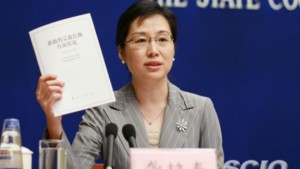On the Eve of Ramadan, China Releases White Paper on ‘Freedom of Religion’ in East Turkestan
For immediate release
6 June 2016
Contact: World Uyghur Congress www.uyghurcongress.org
0049 (0) 89 5432 1999 or [email protected]
The World Uyghur Congress is deeply concerned by the White Paper recently released by the Chinese Communist Party that suggests that freedom of religion has been widely protected in East Turkestan. Basic facts in the document are clearly unsubstantiated considering the countless cases of overt discrimination on the basis of religion.
The White Paper titled, Freedom of Religious Belief in Xinjiang, goes on to claim that freedom of religious belief in the region, “cannot be matched by that in any other historical period” and claims that, “No citizen suffers discrimination or unfair treatment for believing in, or not believing in, any religion”.
These claims have been central to China’s purposeful framing of the conditions on the ground in East Turkestan as a harmonious and developing society based on the rule of law and cultural and religious freedom for all. Nothing could be further from the truth, however, as reports continue to cast light on the deepening restrictions on religious practice and cultural expression.
Religious freedom for the Uyghur community has long been under threat from China’s highly restrictive policies. We have witnessed concrete measures in East Turkestan that contradict the very foundation of China’s claims in the recent White Paper and in other documents.
In 2015 and 2016, Uyghurs were restricted in their ability to fast during Ramadan, forced to sell alcohol and cigarettes from their shops, banned from using traditional Muslim names, barred from teaching their children the Quran, prevented from growing beards or wearing the hijab, banned from using traditional Muslim names, prevented from mosque construction or repair, and prohibited from all religious activity outside state-sanctioned mosques—all the while enlisting and rewarding local informants to notify authorities if any of these proscribed activities are taking place.
The net result of these regulations has been the effective criminalization of Islam practiced outside state-controlled mosques. ‘Illegal religious practice’ in East Turkestan has amounted to little more than praying in one’s own home, with more and more Uyghurs sentenced to unjustifiably long jail terms as a result.
In March of this year, a group of farmers were sentenced to between seven and nine years in prison for praying together in places that authorities had not designated for Muslim worship. In early May, a Uyghur man was sentenced to seven years in prison for viewing a Muslim film that was deemed inappropriate by the state.
Furthermore, this is certainly not the first White Paper that has been released suggesting that religious freedom is upheld in East Turkestan. In September 2015, the Information Office of the State Council released a more comprehensive document entitled, Historical Witness to Ethnic Equality, Unity and Development in Xinjiang, that dedicates an entire section to its claim of government-mandated ethnic harmony. Much of the document goes on to praise the work of the regional authorities in marinating ethnic harmony, but fails to touch on the divisive policy that directly targets the Uyghur community in particular.
What we see in reality, however, is quite the opposite. The gulf that has been maintained between professed principles and de facto policies remains as wide as ever. It is therefore the continued role of civil society and the international community to highlight the problem and to underscore the importance of closing the gap.


